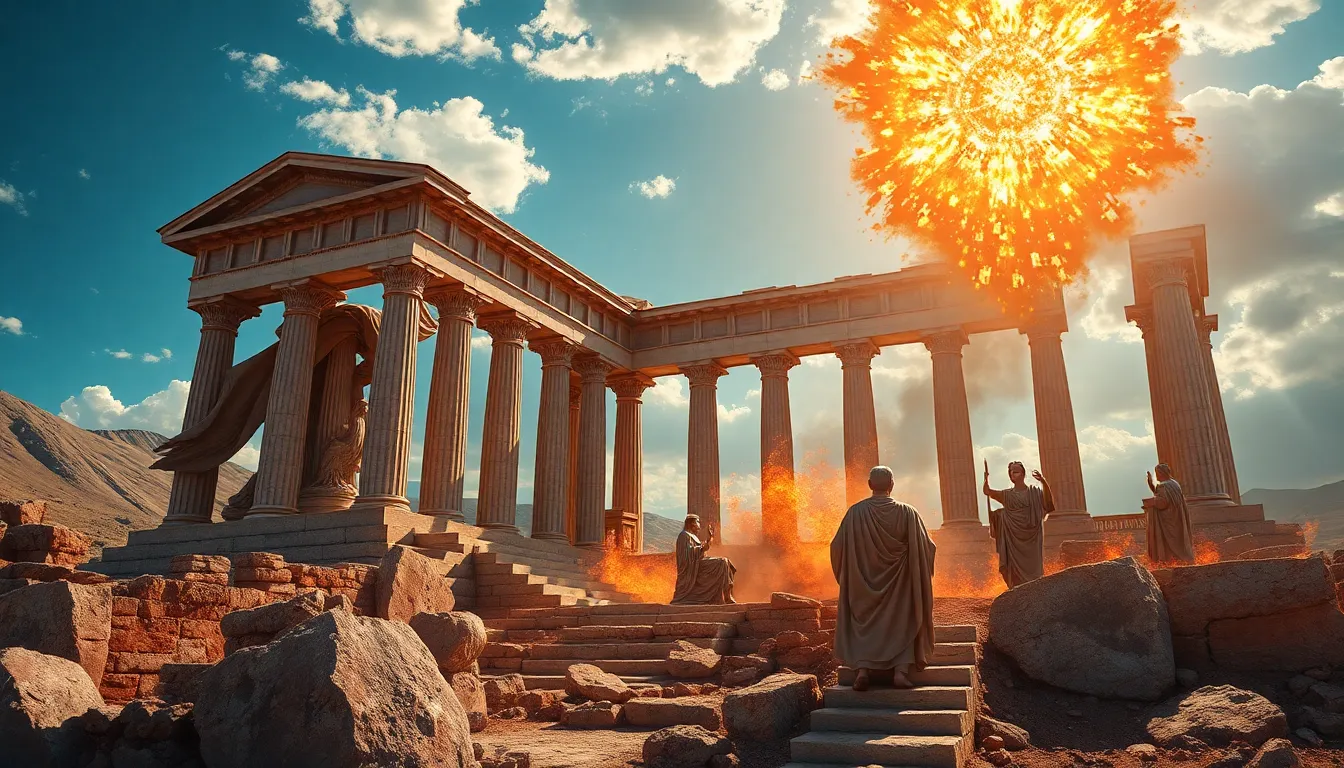The Influence of Chaos on Ancient Greek Philosophy
I. Introduction
In the context of ancient Greek thought, chaos is often understood as a primordial void or a state of disorder that precedes the organized universe. This concept of chaos is not merely a lack of order; it embodies the potential for creation and the dynamic interplay between order and disorder.
The significance of chaos in philosophical discussions lies in its dual nature as both a beginning and a challenge to the established order. The philosophical inquiries prompted by chaos have led to profound insights into the nature of existence, cosmology, and the human condition.
The purpose of this article is to explore the influence of chaos in ancient Greek philosophy, tracing its origins, its development through various philosophical schools, and its lasting legacy in both ancient and modern thought.
II. Historical Context of Chaos in Ancient Greece
The concept of chaos in ancient Greece can be traced back to pre-Socratic philosophy, where it began to take shape as a significant philosophical theme. Initially rooted in mythology, chaos transitioned into a more abstract philosophical notion that was crucial for understanding the cosmos.
Key historical figures such as Hesiod, Anaximander, and later philosophers contributed to the evolving understanding of chaos. Their works reflect a movement from mythological explanations of the universe to rational, philosophical interpretations.
III. Chaos in Pre-Socratic Philosophy
Hesiod, one of the earliest Greek poets, introduced the concept of chaos in his works, particularly in “Theogony,” where he describes chaos as a primordial state from which the first deities emerged. Hesiod’s chaos is a formless void, an abyss that precedes creation.
In contrast, Anaximander’s concept of the ‘apeiron’ (the boundless or infinite) offers a philosophical interpretation of chaos. He posited that the apeiron was the origin of all things, representing an indeterminate state from which the cosmos is formed.
This emergence of chaos as a primordial state marks a crucial point in ancient Greek thought, reflecting a transition from mythological narratives to philosophical inquiry.
IV. Chaos and the Cosmos
The relationship between chaos and the creation of the universe is a central theme in ancient Greek philosophy. Chaos is often seen as the starting point of the cosmos, a necessary condition for the emergence of order and structure.
Chaos influenced the concept of order, or ‘cosmos,’ highlighting the dynamic tension between these two states. This interplay has significant philosophical implications, suggesting that order is not merely the absence of chaos but rather a transformation of chaotic potential into structured reality.
V. The Influence of Chaos on Classical Philosophers
Plato’s view of chaos is intertwined with his Theory of Forms. He perceived chaos as a representation of the imperfect world of appearances, contrasting it with the ideal forms that exist in a realm of perfect order. For Plato, understanding chaos is essential for grasping the nature of true knowledge and reality.
Aristotle, on the other hand, interpreted chaos differently. He rejected the notion of a primordial chaos, proposing instead that the universe is inherently ordered and that any perceived chaos arises from our limited understanding of natural processes. His natural philosophy emphasized empirical observation and the inherent order of nature.
The contrasting views of chaos among key philosophers demonstrate the diverse interpretations of this concept in ancient thought, highlighting its complexity and significance.
VI. Chaos in Hellenistic Philosophy
During the Hellenistic period, the Stoics developed a unique understanding of chaos and order. They viewed the cosmos as a living being, governed by rational principles, where chaos serves as a precursor to order. For the Stoics, embracing chaos was essential for achieving harmony with the universe.
Epicureanism, on the other hand, approached chaos from an atomistic perspective. Epicureans believed that the universe is composed of indivisible particles (atoms) moving through the void (chaos). They posited that random motion and collisions among atoms could lead to the formation of complex structures, emphasizing a naturalistic account of creation.
The lasting effects of chaos in later philosophical thought can be seen in the ways these schools of thought shaped discussions on ethics, metaphysics, and the nature of reality.
VII. The Legacy of Chaos in Philosophy and Beyond
The ancient Greek notions of chaos have profoundly influenced later philosophical movements, including Neoplatonism and existentialism. These movements have explored the themes of chaos and order, often reflecting on the human condition and the search for meaning in a seemingly chaotic world.
In modern interpretations, chaos theory has emerged as a significant area of study in both philosophy and science. The principles of chaos theory, which address complex systems and the sensitivity of initial conditions, resonate with ancient philosophical inquiries about order and disorder.
The relevance of chaos in contemporary thought is evident in various fields, including psychology, sociology, and ecology, where the dynamics of chaos and order play crucial roles in understanding complex phenomena.
VIII. Conclusion
In summary, the exploration of chaos in ancient Greek philosophy reveals its complexity and significance in shaping philosophical discourse. From Hesiod’s primordial chaos to the contrasting interpretations of Plato and Aristotle, chaos has served as a pivotal concept in understanding the universe and our place within it.
The ongoing significance of chaos in philosophy reflects its enduring relevance in grappling with the complexities of existence and the dynamic interplay between chaos and order. As we continue to explore these themes, we gain deeper insights into the nature of reality and the human experience.
In conclusion, the interplay between chaos and order remains a fundamental aspect of human thought, inviting us to reflect on the balance between creation and destruction, certainty and uncertainty, in our understanding of the world.




